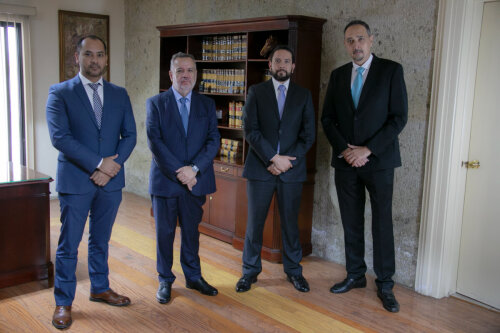Best Funds & Asset Management Lawyers in Puerto Vallarta
Share your needs with us, get contacted by law firms.
Free. Takes 2 min.
List of the best lawyers in Puerto Vallarta, Mexico
About Funds & Asset Management Law in Puerto Vallarta, Mexico
Funds and asset management refers to the professional handling, investment, and oversight of various types of assets, such as real estate, shares, bonds, and other financial products. In Puerto Vallarta, these services are especially important due to the city’s rapidly growing real estate market, increase in international investment, and the need for estate planning among both Mexican nationals and foreigners. Legal guidance ensures that investments, trusts, and portfolios are managed in compliance with local, state, and federal regulations, helping individuals and organizations maximize returns and protect assets.
Why You May Need a Lawyer
People often seek legal assistance in funds and asset management in Puerto Vallarta for a variety of reasons. These include:
- Setting up and managing investment portfolios. - Forming trusts or fiduciary structures for estate planning. - Navigating foreign investment regulations. - Ensuring compliance with anti-money laundering and tax laws. - Managing joint ventures or real estate funds. - Structuring corporate holdings or family offices. - Resolving disputes over asset inheritance or investment management. - Addressing legal issues that arise from cross-border asset transfers. - Handling due diligence for property or business acquisitions. - Protecting assets from legal disputes, creditors, or unforeseen claims.
Local Laws Overview
Puerto Vallarta operates under Mexican federal law, alongside Jalisco state laws and local municipal ordinances. Some of the key legal considerations for funds and asset management include:
- The Securities Market Law (Ley del Mercado de Valores), which regulates investment funds and portfolio management. - The Law for the Regulation of Financial Technology Institutions (Fintech Law), affecting digital assets and online investment platforms. - Rules for foreign ownership of certain properties, particularly in restricted coastal zones. - Anti-money laundering and know your customer (KYC) requirements. - Specific tax regimes for residents and non-residents, covering capital gains and inheritance. - The role of public notaries in authenticating transactions and registering ownership. - Trust formation rules, especially for foreigners buying property via fideicomiso (bank trust).
Local legal professionals can help clients understand, comply with, and leverage these laws for efficient funds and asset management.
Frequently Asked Questions
What types of assets can be managed in Puerto Vallarta?
Asset management can include real estate, stocks, bonds, mutual funds, business interests, intellectual property, and other financial or tangible assets.
Can foreigners own property or invest in funds in Puerto Vallarta?
Yes, but foreigners may need to use a bank trust (fideicomiso) for properties in restricted zones, which includes most of Puerto Vallarta’s coastline. Foreigners can also invest in local funds, subject to certain regulations.
What is a fideicomiso and why is it important?
A fideicomiso is a Mexican bank trust that allows foreigners to acquire rights to property within restricted zones. The bank acts as trustee, but the beneficiary (foreign owner) retains control over the property.
Are there specific tax issues for people managing assets in Puerto Vallarta?
Yes, taxes may apply to capital gains, rental income, inheritance, and other transactions. Tax liabilities can vary for residents and non-residents, so legal advice is recommended.
How are investment funds regulated in Mexico?
The National Banking and Securities Commission (CNBV) oversees investment funds. These entities must comply with the Securities Market Law and other financial regulations.
What legal steps are needed to create a family trust?
Setting up a family trust involves drafting a trust agreement with either a public notary or a bank, identifying beneficiaries, and appointing a trustee. It’s important to comply with both local and federal laws.
Is estate planning necessary for foreigners in Puerto Vallarta?
Estate planning is highly recommended for both locals and foreigners to ensure that assets are distributed according to their wishes and to avoid legal complications for heirs.
What protections exist against fraud or mismanagement of funds?
Mexican law includes anti-fraud provisions, and asset managers must comply with oversight from regulatory agencies such as the CNBV. Contracts and documented management structures provide additional safeguards.
What role does a public notary play in asset management transactions?
Public notaries in Mexico have significant responsibilities, including formalizing real estate sales, authenticating signatures, recording transactions, and ensuring compliance with legal protocols.
How can legal disputes over assets be resolved?
Disputes are typically resolved through local courts, mediation, or arbitration. Having clear contracts and legal documentation helps facilitate smoother resolutions.
Additional Resources
- The National Banking and Securities Commission (CNBV): Oversees the regulation of investment funds in Mexico. - The Mexican Association of Private Equity and Venture Capital Funds (AMEXCAP): Provides information and support for fund managers and investors. - Jalisco State Notary Offices: Assists with legal documentation, trust creation, and asset transfers. - Mexico’s Tax Authority (SAT): Offers guidance on tax compliance for individuals and businesses managing assets. - Local bar associations and chambers of commerce can recommend recognized legal specialists in funds and asset management.
Next Steps
If you require legal assistance in funds or asset management in Puerto Vallarta, it’s best to start by consulting with a qualified local attorney who specializes in this area. Gather all relevant financial and property documents before your initial meeting. Be clear about your objectives, whether it involves investing, estate planning, or resolving a dispute. Ask about the lawyer’s experience with similar cases, the process they recommend, and anticipated costs. Staying informed and seeking expert guidance will help you navigate the legal landscape and protect your interests effectively.
Lawzana helps you find the best lawyers and law firms in Puerto Vallarta through a curated and pre-screened list of qualified legal professionals. Our platform offers rankings and detailed profiles of attorneys and law firms, allowing you to compare based on practice areas, including Funds & Asset Management, experience, and client feedback.
Each profile includes a description of the firm's areas of practice, client reviews, team members and partners, year of establishment, spoken languages, office locations, contact information, social media presence, and any published articles or resources. Most firms on our platform speak English and are experienced in both local and international legal matters.
Get a quote from top-rated law firms in Puerto Vallarta, Mexico — quickly, securely, and without unnecessary hassle.
Disclaimer:
The information provided on this page is for general informational purposes only and does not constitute legal advice. While we strive to ensure the accuracy and relevance of the content, legal information may change over time, and interpretations of the law can vary. You should always consult with a qualified legal professional for advice specific to your situation.
We disclaim all liability for actions taken or not taken based on the content of this page. If you believe any information is incorrect or outdated, please contact us, and we will review and update it where appropriate.










